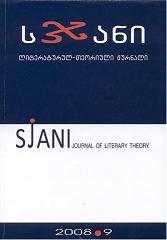ამირანის მითის კომპოზიციური თავისებურებანი
Compositional Peculiarities of Amirani's Myth
Author(s): Dalila BedianidzeSubject(s): Customs / Folklore
Published by: ლიტერატურის ინსტიტუტის გამომცემლობა
Keywords: Amirani's myth; Svan version; compsoitional details
Summary/Abstract: Amirani’s myth is an ancient Georgian legend. There exist a number of its variations. The Svan version of the myth represents Amirani’s story most precisely and clearly. According to Svan version of Amirani’s myth its compositional details are the following: 1. Love story of Amirani’s parents 2. Amirani’s birth 3. Placing Amirani’s cradle on the bank of the river and his baptizing 4. Amirani in his father’s house 5. Amirani returns his father’s eye/ first heroism 6. Amirani’s meeting with one-eyed Ogre (Devi) 7. Amirani’s and his brothers struggle with Ogres (Devis) 8. Amirani defeats Ogre (Devi) 9. Amirani’s battle with dragons; swallowing of Amirani by Black Dragon 10. Amirani’s coming out from dragon’s belly 11. Searching for Qamari 12. Amirani and hero Ambri 13. Kidnapping Qamari, a maiden unseen by the sun 14. Struggle with Qamari’s father and death of Amirani’s brothers 15. Amirani’s suicide; Qamari restores him and his brothers to life 16. Amirani – oath breaker 17. Amirani challenging the God 18. Amirani’s chaining Some of the compositional details of Amirani’s myth have something in common with elements depicting adventures of mythic heroes of other countries. For example, there are similarities in comparison with Greek myth: Prometheus’, Heracles’, Theseus’, Peirithous’ myths. Hero’s birth and his struggle with different evil creatures should be singled out among them. Compare Heracles – struggling with snakes and Amirani – with dragons, hero’s challenging with God or Gods and his punishment, in some cases chaining, in some cases placing under mountain / see Armenian myth – Mheri, in some cases chaining on the chair / see Theseus and Peirithous The heroes of Greek myth are finally liberated. Amirani frees himself too, but we come across this detail not in Georgian myth, but in Georgian folk epic “Source of Pomegranates”, recorded by Elene Virsaladze.
Journal: სჯანი
- Issue Year: 2008
- Issue No: 09
- Page Range: 168-173
- Page Count: 6
- Language: Georgian

